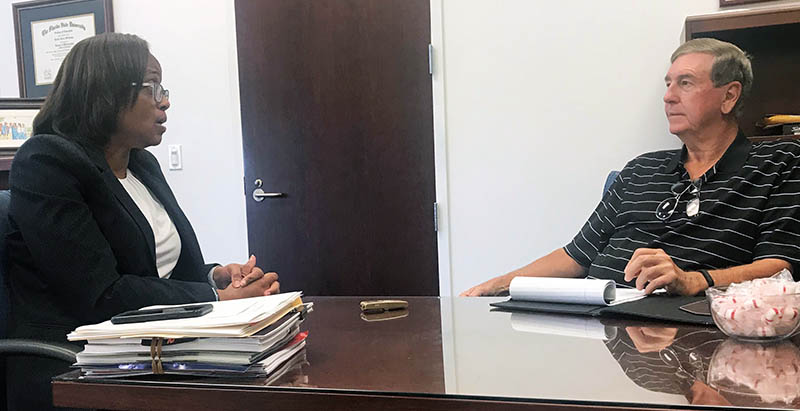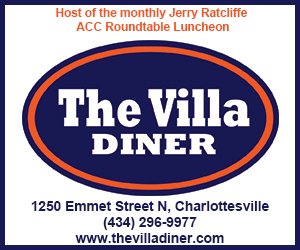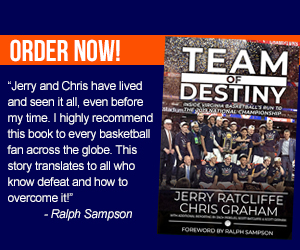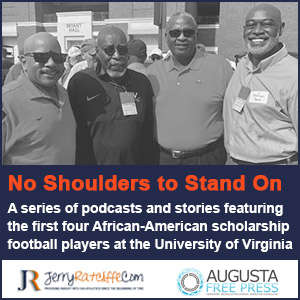Part I: Q&A With Virginia Athletic Director Carla Williams

Earlier in the week, our Jerry Ratcliffe had the pleasure of sitting down for a one-on-one interview with Virginia director of athletics Carla Williams at the McCue Center. Here is the first of a two-part Q&A with Williams:
Jerry: We’ve heard that you have thrown your hat into the recruiting ring and have made an impact not only with prospects, but also their mommas and daddies. Is that something you’ve had a history with as an administrator?How has it evolved?
Carla: I think my love of recruiting comes from a lot of places. I’m in this profession because I love young people, I love education, and I love sports.
I was recruited out of a small town in Georgia, a town of 30,000 people, and when college coaches came to watch practice – and there were upperclassmen that were being recruited, and I as I got better came to see me play – I was always fascinated by the fact that someone could come in and watch you play a sport, and offer you a scholarship and help you get a college education. That just fascinated me from the beginning.
When I got to Georgia, graduated, and went into coaching, and knew that being able to do that (offer scholarships) with other young people, was very appealing to me. I fell in love with recruiting from the start. We had a lot of success [with recruiting] when I was coaching and so that made me love it even more because I was pretty good at it. When I went into administration and continued to grow as an administrator, I would always help out and different coaches from different sports would ask me to talk to prospects and their families, and I enjoyed doing it.
That’s something I did at Georgia the last 13 years and so I felt like it was definitely a part of why I love my job and wanted to continue to do it here.
Jerry: How did that help at Georgia in terms of football?
Carla: I met with prospects and families from all the sports. I vividly remember meeting with some of our football prospects coming out of high school. We had a ton of unofficial visits all the time, so you got to see them grow through high school, and when they were ready for their official visits you really already knew them.
I think that as a coach, having administrators who the parents and student-athletes feel comfortable with is critically important because as a mom you’re leaving your child with someone and it’s great to know there’s someone outside of the coaching staff that will take an interest in your child outside the sport. I think that’s appealing.
Jerry: What types of questions do you get from the parents?
Carla: As an athletic director and administrator I can only visit with recruits on Grounds. Only the full-time coaches can go off Grounds to recruit.
I meet with them [at the McCue Center] and the questions I get cover a broad range.
“What about the coaches? What about the university? What about the community? Is it welcoming? Is it safe? What about the education?”
I have a chance to talk about family, the community, the academic nature of the university, the coaches and the character of the coaches and their staff, the character of the student-athletes on the teams. I have an open-door policy for our student-athletes. I think it’s important for them to see me, so I talk about my interactions with student-athletes and the programming we put into place to help them beyond their sport, such as leadership development, career development, community engagement, personal development. Those are all things that parents want to hear universally. A lot of prospects I visit with want to hear about that as well.
Jerry: As far as the feedback from Bronco, has your involvement been an effective influence? We’ve heard that it has.
Carla: I would hope so. You would have to ask him for sure, but I see the first-years that I met with when I first got here and there’s an instant connection. I ask how they’re doing in school, how their parents are doing, and so that’s a relationship that grows over their time here, which is what you should have. The student-athletes should feel a strong bond and connection to their university so they feel comfortable coming back, they feel comfortable supporting, they feel comfortable giving, they feel comfortable recruiting for the university, and that starts with their experience here. I just see that as a big picture. There are short-term benefits and long-term benefits to it.
Jerry: You have worked hard on getting former players re-engaged in the football program. Fans at the season-opener saw Shawn Moore, Herman Moore, Heath Miller, and Aaron Brooks standing on the sidelines. How is that project going?
Carla: Jim Booz (deputy athletics director for administration) helped us engage and re-engage former players at Georgia. It’s not anything that’s unique to any particular school. In order for those players to feel comfortable coming back, there has to be a connection.
Every time there’s a coaching change, there’s a loss in the connection. It really has to be a departmental focus to make sure that former student-athletes are connected to the program. We’ve had lots of phone calls, text messages, and emails to former players to invite them to practices, and to games. It’s about reaching out and being genuine about wanting them to be part of their program and their university.
Jerry: How do you accomplish that without making those athletes feel like, ‘Oh, my university just wants me to come back and donate money?’
Carla: Because I say that. I don’t want their money (she laughs), and they know it. I want their presence. We need their presence. It is is their program and it is their university. I just say it.
Jerry: Never hurts to see those guys on your sidelines during games when the TV cameras pan that area and point out, there’s so-and-so, who was an All-American here and had a stellar career in the NFL.
Carla: Absolutely. Recruits see them and know they are involved. I think being a part of something that’s bigger than yourself is what makes great teams. We want them to know that they’re part of something that’s special.
Jerry: Have any of those players that have returned said anything meaningful to you?
Carla: I’ve had some great conversations, some great one-on-one conversations with several of the players about what we’re trying to build so that we can be consistently competitive, and they know that I care a lot about this program … that we need them to actually make it work.
Jerry: Talk about a new football facility, a new football home has been circulating for a long time. Are you making the “ask” from your donors? What’s the update on that process?
Carla: We are, and have been for the last eight months, talking to donors about what we need. We are still going through the process of designing the facility. Once we get board approval and get closer to designing the facility, we’ll be able to talk more specifics to donors.
But for the last eight months I have talked to anyone who would listen about what the program needs and why the program needs it. Everyone has been great. There was a knowledge, certainly before I got here, that there was a need for a football facility. Craig (Littlepage) had already put it before the Board of Visitors. Some of the things I’ve emphasized is the fact that we have basic needs. We don’t have a desire to be in excess. We just want to meet the basic needs of our student-athletes so that they can train and condition and practice and develop safely, so that they can be consistently competitive.
We are unique in that regard. Northwestern’s facilities are some of the best in the country and they compare with us academically. There are other institutions that are similar academically that have adequate to superior facilities. So the focus for us has been, what does the University of Virginia need … what do we need to be consistently competitive where we are?
We really haven’t looked at some of the other schools because they are doing things they feel like they need to do for their programs. We have to do what we think what we need for our program, fill the basic needs for our student-athletes and our coaches, that’s what we’ll do.
Jerry: Former coach Al Groh told the previous administration that Virginia had fallen behind the rest of the ACC in terms of supporting the football program, and those administrators told me over the last two years that they failed to listen and have been paying a price for quite some time. How much ground do you have to make up on the league?
Carla: I think that there are some definite challenges for us that probably have accumulated over time that directly impact the success of the team. All of the things that you would think … it’s not rocket science, but you obviously have to have talent to consistently compete. That talent has to be developed through nutrition, strength and conditioning, coaching, technology, and staff, so all of those things contribute to helping you identify talent, helping you recruit talent, enroll talent, and develop talent. We are working on all of those.
Jerry: Since you’ve arrived, you added personnel in certain areas of the football program and added budget. Have those moves already paid dividends or is it too early to tell?
Carla: I think when you talk about identifying talent sooner, talent that fits UVa, talent that would be interested in UVa. I think that’s happening now. Bronco will tell you the same thing, that doubling the strength and conditioning staff means a lot when you’re thinking about 100-plus young men that are competing in a very physical sport.
It’s early but there are early indicators that we’re moving in the right direction.
Jerry: A lot of different factors have led to a less than full Scott Stadium over the years. How hard are you working on finding ways, other than the obvious way of just winning, to put fannies in the seats?
Carla: We meet on it constantly. Customer service, fan experience, parking, security. It is something that we constantly consider and talk about on a regular basis because you have to do all of that. You have to be successful on the field, but the experience has to be pretty good also to keep fans coming back.
It’s a conversation that’s going on across America right now. We’re certainly no different. Where we are unique is that our fans, our alums love sports, but they also love the university and love being on Grounds. I think Virginia is uniquely positioned in that regard because there is a lot of room for improvement for us. I think once we are consistently competitive, then Virginia takes a huge step forward in college athletics. Not just in football, but college athletics.
Jerry: The emphasis downstairs in the football offices has been on beating Virginia Tech and ending the losing streak in the football rivalry. How important is it to make that happen?
Carla: Very, very important. But it is every year no matter what. It’s important to Virginia Tech to beat Virginia. That’s what rivalries are. You’re supposed to want to beat the other team. The fact that we haven’t done it in a while adds to that desire. It is important when you’re trying, not to just recruit, but to sign great players that are also great students and fine young men in the state to the University of Virginia. It’s important that we win our fair share of those games.
Jerry: You once said that UVa isn’t only recruiting against ACC teams for football talent, but other similar academic institutions around the country for that same talent pool. How do you view that?
Carla: There are only two other publics ahead of Virginia when you think about academic institutions, and they’re on the West Coast. I think we are positioned, if we can show an investment, if we can improve on the field, and become consistently competitive, then we should be able to attract those great students, who are great players and fine young men, to the University of Virginia.
Virginia, just like other places – there aren’t many – can be a leader in showing that academic success and athletic success don’t have to be mutually exclusive. There are plenty of young men in this region who will excel academically at Virginia, who are great players, and that fit the core values that we’re looking for. When you can do that, then that is the ideal of college athletics, and I’m convinced that Virginia is the place to do that, and that we have the coach, university, and fan base to do that. We just need to start attracting those recruits.
Jerry: You haven’t been here that long, but have you had an opportunity to talk with George Welsh?
Carla: Yes, I met with him right here (McCue Center).
Jerry: What were you curious about?
Carla: I love asking questions. I ask a lot of questions. We met for over an hour and we just talked about football, football in general, Navy football, Virginia football. We talked about Virginia Tech. We talked about recruiting, about winning and losing.
I basically picked his brain for over an hour and it was awesome. It was awesome. I learned a lot.
Jerry: What did you learn most that will help you going forward?
Carla: I asked him about recruiting, how he was able to recruit the players that he brought here. Part of it, he was familiar with this area because he was at Navy, and knew the recruiting area. And, at that time, Virginia Tech was not Virginia Tech.
So, it’s a little bit of a different challenge for Bronco today because Virginia Tech has done a good job in football. That was good for me to understand just from a historical standpoint why we were able to do what we were able to do while he was here, and how that impacts today, and where we are now, and what challenges that creates for a football coach.
It’s not something that happens over night, because it didn’t get this way overnight.
(Friday: Part 2 of our conversation about Virginia’ overall athletic prowess and how Carla Williams has made the adjustment from Bulldog to Wahoo, and what she likes about Hooville)








